GROWING WILD
Dune spinach and nettles – a storming cook-up with Abalimi
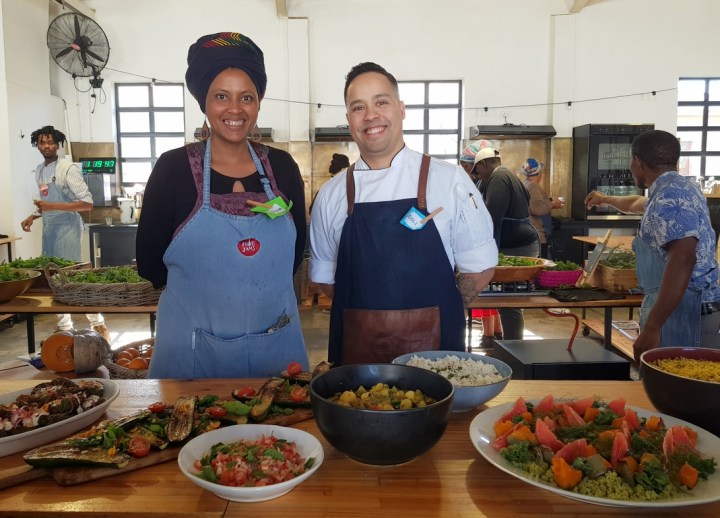
Chefs and farmers celebrated 40 years of Abalimi Bezekhaya’s organic community gardens with an inspiring cook up, featuring cultivated indigenous plants and sparkling fresh produce.
Dune spinach, sea pumpkin, wild rosemary; these are indigenous wild South African ingredients that you’d expect to find on fine dining menus when the chef is an expert forager, but as we arrive at Food Jams, in Cape Town’s Salt River, for a cook-up with Abalimi Bezekhaya, a long table down the centre of the room is filled with baskets of freshly harvested leaves, vegetables and herbs.
There is not a spinach or chard leaf in sight. Instead, leaves like stinging nettle, blackjack and milk thistle gleaming with freshness eclipse the humble onions, pumpkins, potatoes that are the supporting cast. Labels and blackboards identify the unfamiliar ones and as farmers and chefs arrive they gravitate towards the table, sparking animated discussions and examining leaves that we will soon be cooking with.
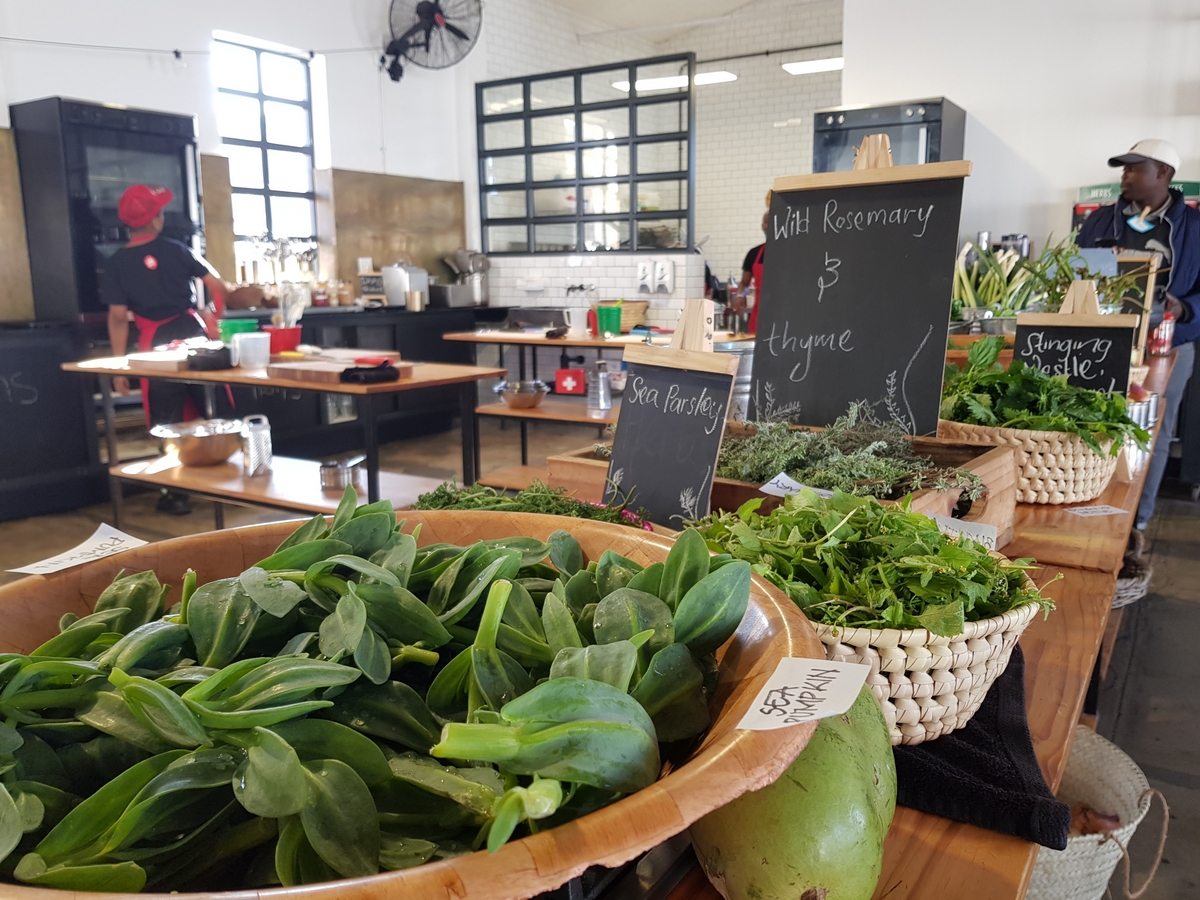
Sparklingly fresh sea pumpkin leaves, with sea parsley, wild rosemary, stinging nettles and more play the starring role, but there are plenty of humble vegetables to play a supporting role in this feast. (Photo: Kit Heathcock)
The occasion is Abalimi Bezekhaya’s 40th anniversary – 40 years since the organisation started supporting organic vegetable growing in Cape Town’s townships.
Nowadays they support over 80 community gardens and 600 home gardens spread through Khayelitsha, Gugulethu and all the Cape Flats – teaching, supplying infrastructure, building soil health with composted manure, and importantly providing market access.

One of the community gardens supported by Abalimi Bezekhaya in the Cape Flats townships of Cape Town (Photo: Supplied)
Before Covid-19 they partnered with Harvest of Hope to sell their produce around Cape Town, between 2008 and 2019 selling R16-million of fresh produce and channelling R10-million into the township economies just through selling vegetables. Now they are rebuilding after the devastation of Covid-19, and this event is aimed at connecting chefs and farmers and getting the word out that Abalimi is back, fresh and ready to go, and stronger than ever.
The plan for the day is a cook-up followed by a harvest long table lunch – with eight teams producing two dishes each from the assembled fresh ingredients and a dry goods pantry – all vegetarian: with this sparkling variety of beautiful produce, who needs meat.
After a brief introduction from Grace Stead and Babalwa Mpayipeli of Abalimi, it’s time to get to work. We’re all colour coded – green name labels for the eight farmers, blue for the chefs, yellow for media and orange for guests, who might be more farmers or others connected to Abalimi. So in a process reminiscent of the children’s game “The Farmer’s in his Den”, the farmer picks a chef (name drawn at random from a paper bag) the chef picks a media name and then the farmer picks a name from the orange guest list and we have our teams, our table with four chopping stations and a mission.
The wild foods fundi who explains the challenge is Loubie Rusch of Making KOS, who has co-curated the event with Abalimi. She’s the author of Cape Wild Foods: A Growers Guide in collaboration with the Sustainability Institute, a copy of which she now presents to each of the farmers. “For millennia indigenous plants have traditionally not been cultivated, just picked in the wild – I wanted to make sure that we start to know these Western Cape winter rainfall foods and use them again,” she says. “But picking them in the wild, I didn’t see as sustainable.”
Unable to interest a farmer in the project, she was welcomed in 2016 to Moya Wekhaya, one of Abalimi’s community farms in Khayelitsha, and started cultivating some of the wild foods that we see in the baskets. Now several of the farmers here today are already growing these indigenous plants and edible wild plants usually considered weeds, providing a fantastic resource for chefs who don’t have the time or place to forage for themselves. Rusch’s challenge to us is simple – each team must create a starter and main dish to feed six, using at least one wild or indigenous ingredient in each dish, the rest is up to us.
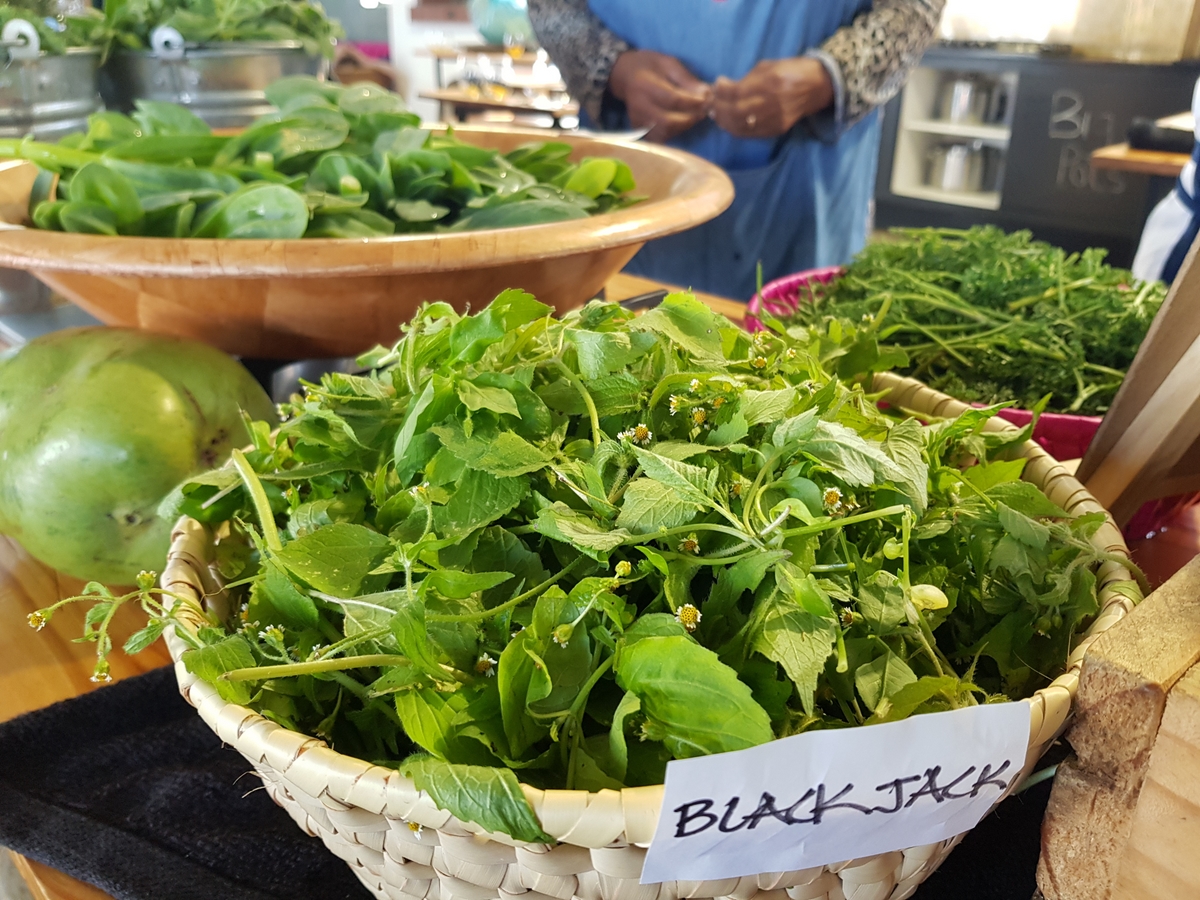
Blackjack leaves are considered a weed by most farmers but make a fabulous pesto. (Photo: Kit Heathcock)
I’m on a team with farmer Nomalanga Ruiters of Sunshine Organic Farm and Nursery, who has grown many of the wild ingredients on display. Our chef is Wesli Jacobs, executive chef of the Table Bay Hotel, and we are working with Obert Guriri, of PEDI Organics, the logistics team connecting the Abalimi farmers with the market (you can buy direct from the individual farmers or alternatively order through PEDI to get a wide selection of produce from different farmers).
Chef Jacobs is remarkably calm considering he’s swapped his professional kitchen team for two home cooks and one professed non-cook. He starts by asking us each what we like cooking and then decides we should start from the produce that Ruiters has provided. She shows us baskets of milk thistle and blackjack, weeds to most people but tasty and vibrant leaves to farmers with vision.
“I normally stir fry milk thistle with a base of other sweet leaves and make pap on the side,” she says. But it can be bitter on its own. She often makes a pesto with blackjack leaves, so chef Jacobs goes for that idea and thoughtfully picks up a beautiful pumpkin.
We have our starter – roasted pumpkin on a bed of couscous, dressed with blackjack pesto. Next we look at the glass vase of sandkool or wild asparagus, also from Ruiters’ farm. She gets us to taste it raw and chef Jacobs reckons it’s comparable to green beans, suggesting a sandkool and potato curry in coconut milk for our main dish. Soon he has our non-cook, Guriri, confidently chopping pumpkin, Ruiters in charge of pesto and I start peeling potatoes for the curry.
The Food Jams venue is set up for exactly these types of events and their team are in the background, helping us find pans, clearing away the containers of peelings etc for compost, and washing up in the background. Shared ovens and hobs line one side of the room and I’m impressed how chef Jacobs smoothly organises us, no commands, no stress, just gentle suggestions of what we can do next.
Soon I’m reducing garlic and ginger to a paste with a microplane grater (what a joy and now on my kitchen wishlist) then chopping onion and hoping it’s fine enough by chef’s standards. Meanwhile Guriri has roasted his pumpkin and chef Jacobs has him seamlessly cutting up a ruby grapefruit. This is going to be a beautiful dish and Guriri is demonstrating precision skills in cutting and plating.
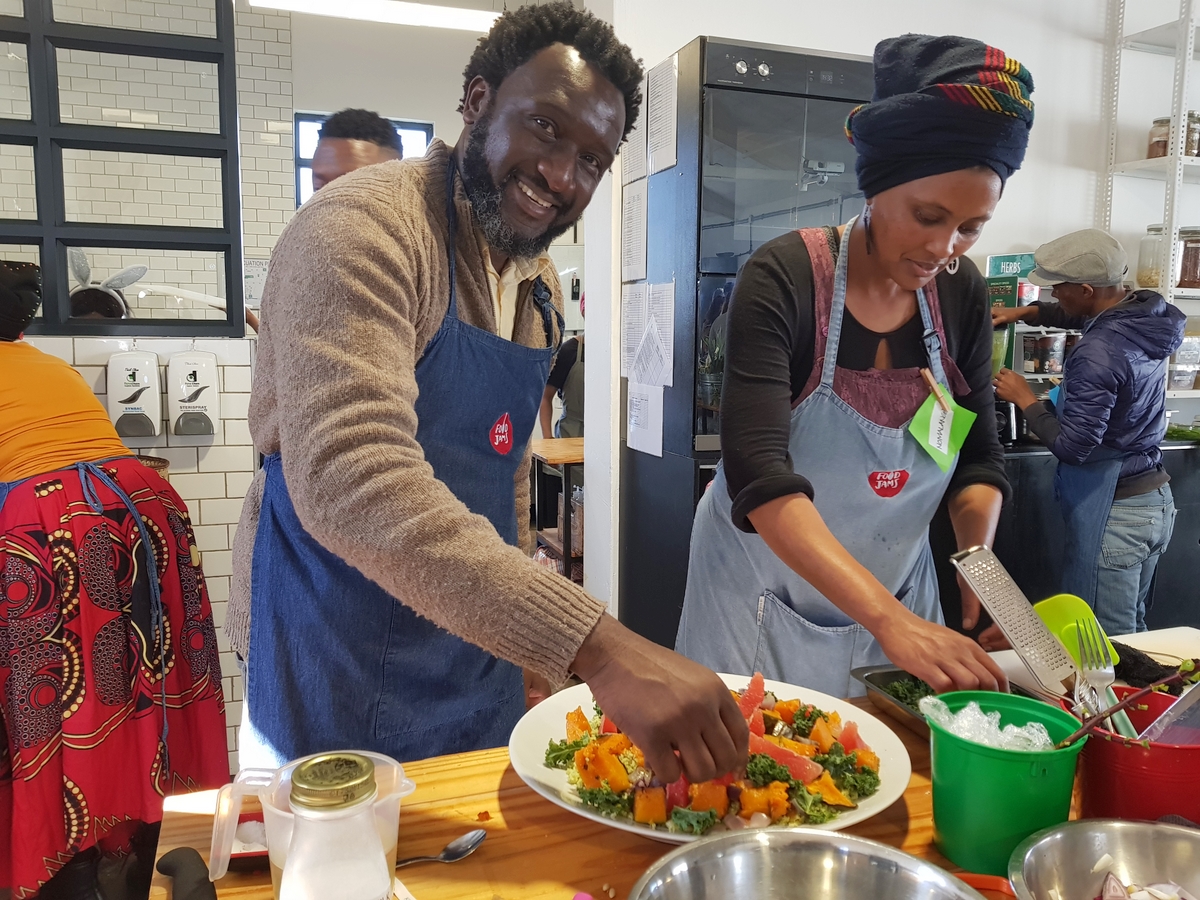
Obert Guriri and Nomalanga Ruiters put the finishing touches to our starter of roast pumpkin on a blackjack pesto couscous with ruby grapefruit and kale. (Photo: Kit Heathcock)
There is an industrious happy hubbub, all eight teams are equally busy, rocking with background music that we can just about hear over the chat – Food Jams really is jamming. I’m stirring our curry at a hob alongside another team who are turning herb flatbreads in a pan, the aromas mingling with a distant drift of smoking impepho (white sage). The curry is coming along beautifully and chef Jacobs decides we have time for a third dish, so Ruiters roasts baby marrows halved lengthways which we’ll serve with chopped nettles, nasturtiums and spekboom, toasted almonds and chopped apricots, in a light lemony vinaigrette, plus the rice and a tomato salsa.

Chatting to food activist, chef and author of Veggielicious, Mokgadi Itsweng, before she got busy cooking with her team – showing the sandkool (wild asparagus) in the middle. (Photo: Kit Heathcock)
Time is running out now. We check the curry, the potatoes are cooked but the thick ends of the sand kool have remained stubbornly hard, like actual asparagus, so we compromise and fish out the tough ends leaving the tender thinner parts to hold the space.
The long serving table loaded with a host of beautiful plates, incredibly varied, considering we’re all working with the same larder of ingredients. The chef and farmer from each team present their plates and then, hungry after our busy morning of cooking, we help ourselves to a taste of each dish and sit down together with a glass of wine from Khayelitsha’s Finest Wines, who have been offering tastings through the morning for those who like to cook with a glass of wine to hand.
There’s no judging or points – this is a celebration rather than a competition – and absolutely everything is full of flavour. It wouldn’t be a birthday party without some of the original members, such as Ma Christina Kaba, who presides from an armchair – after many years teaching others with Abalimi and founding Moya Wekhaya, the largest community garden in Khayelitsha, she’s now officially retired but still grows her own vegetables on the farm and is determinedly fundraising for a community packshed on the land next to Moya Wekhaya.
In times when food prices are soaring, Abalimi plays a more vital role than ever, demonstrating that nutritious organic produce doesn’t have to be the sole privilege of those with deep pockets. These farmers are feeding their families, selling affordably within their communities, as well as to chefs and hotels such as the Belmond Mount Nelson, which has been buying from Abalimi since 2008.
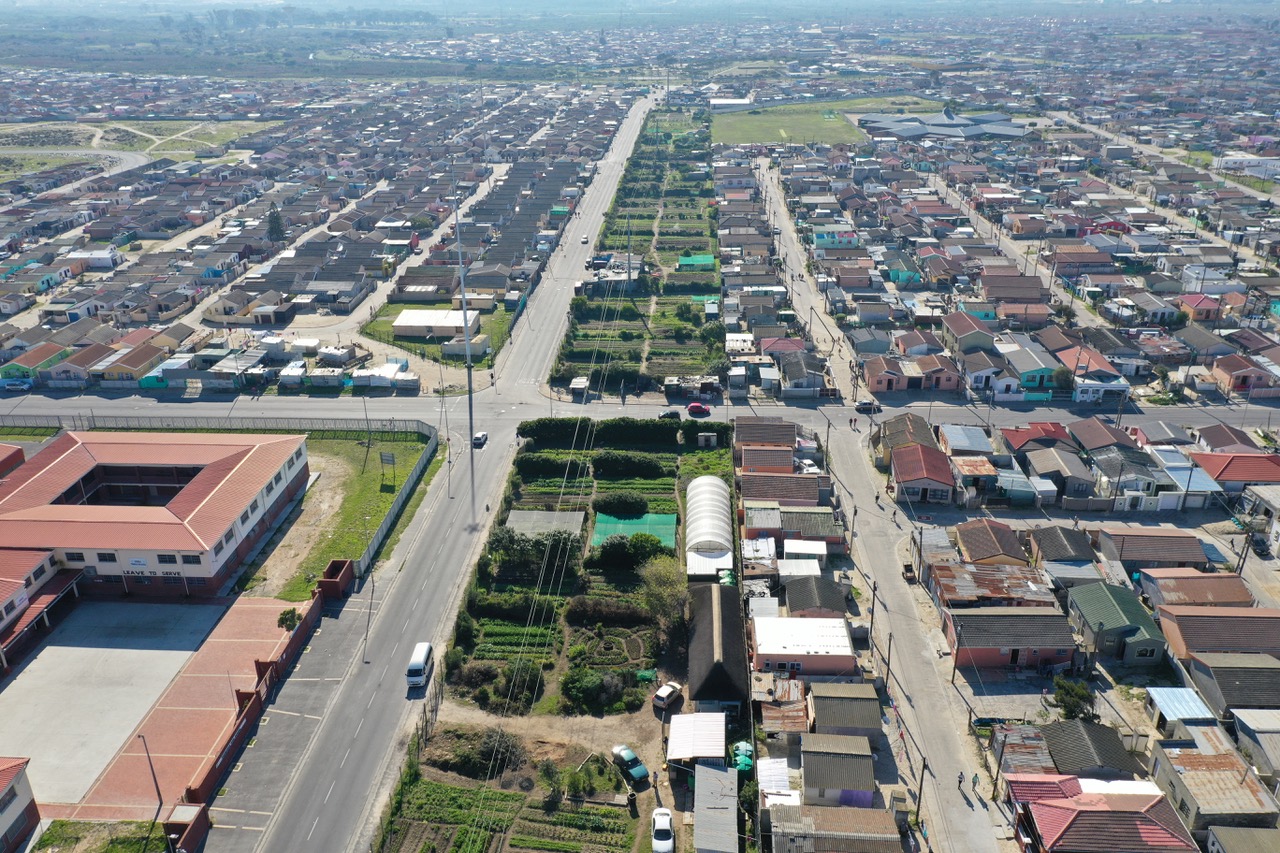
The SCAGA line or powerline project was established by Abalimi in 1996 as the first and biggest group of community food gardens in Khayelitsha, putting to use the empty land under the power cables. (Photo: Supplied)
And it’s a ground roots movement (pun irresistible) – the farmers are inspiring and sharing knowledge of organic farming with others in their communities. Ruiters has helped start 30 more gardens since founding Sunshine Organic in June 2020 and is passing on her knowledge of permaculture principles and the value of good nutrition. “We’re all eating healthily and growing older without wrinkles,” she says with a smile. DM/TGIFOOD
Find out more about Abalimi www.abalimi.org.za
Follow Kit Heathcock on Instagram @kitheathcock
The writer supports Ladles of Love, who supported this event, bringing food activist and author Mokgadi Itsweng down from Johannesburg to take part.






 Become an Insider
Become an Insider
Empowering story. Would be good to have someone write about the actual influence this has had on the area. Let’s have an article on PEDI Organics. Yay DM, good feeling for a Friday. Set’s me up for the weekend.